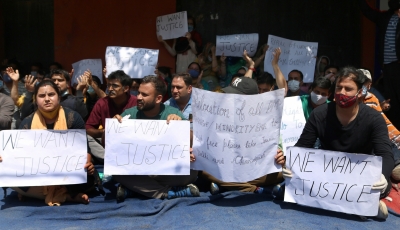Exodus is a political weapon, but Kashmiri Pandits have no voice in power play
By IANS | Updated: November 27, 2022 11:10 IST2022-11-27T11:03:03+5:302022-11-27T11:10:22+5:30
The Assembly elections, as and when they are held in Jammu and Kashmir, do not have much significance for ...

Exodus is a political weapon, but Kashmiri Pandits have no voice in power play
The Assembly elections, as and when they are held in Jammu and Kashmir, do not have much significance for the beleaguered Kashmiri Pandit community. Their scattered population hardly counts in the vote arithmetic of the now defunct state.
Forced out of Kashmir, the community of over seven lakhs has shrunk to a few lakhs in the Union Territory with a major concentration in Jammu and a nominal presence in Kashmir, the place of their origin. Most of the community members are living in Delhi-NCR, Mumbai, Pune, Bengaluru and other parts of the country and in other countries also. The scattering has totally reduced the community's significance in the political power play.
Before the 1989-1990 terror onslaught, the community had a sizeable presence in pockets of all Kashmir districts with a major concentration in Srinagar. Their leaders were given space in the political set up and were made ministers as well.
The major political parties, the National Conference and the Congress, had good representations from the minority community. Late Pyarelal Handoo was a minister in the Farooq Abdullah government and was an MP in the ninth Lok Sabha.
Khem Lata Wakhlu held important political positions in the National Conference, the Awami National Conference and later in the Congress. She also served as a member of the Jammu and Kashmir Legislative Assembly for 12 years and was the state minister of tourism from 1984 to 1986. She was the chairperson of the state's social welfare board with the status of a minister of cabinet rank from 2010 to 2014.
Prior to them, there were stalwarts like D.P. Dhar, who was the Chairman of Policy Planning in the External Affairs Ministry and played a crucial role in the 1971 India-Pakistan war leading to the creation of Bangladesh.
He was a member of the Jammu and Kashmir State Constituent Assembly from 1951 to 1957 which endorsed Kashmir's accession to India. He was also a member of the state Assembly from 1957 to 1967, and was appointed as cabinet minister.
Makhan Lal Fotedar, who was initiated into the Congress by Jawaharlal Nehru, became a political advisor to Prime Ministers Indira Gandhi and Rajiv Gandhi.
The Kashmiri Pandits had a big say in the Centre and the erstwhile state politics. But all this changed as the terrorists targeted the community in late 1980s which finally led to their exodus. The community fled to Jammu first, and from there they migrated to other parts of the country and world. With the dispersion, the community's political strength also nosedived.
Since their exodus in 1990, Jammu and Kashmir has witnessed elections to Assembly, Parliament, Panchayat and the District Development Council
Disclaimer: This post has been auto-published from an agency feed without any modifications to the text and has not been reviewed by an editor
Open in app